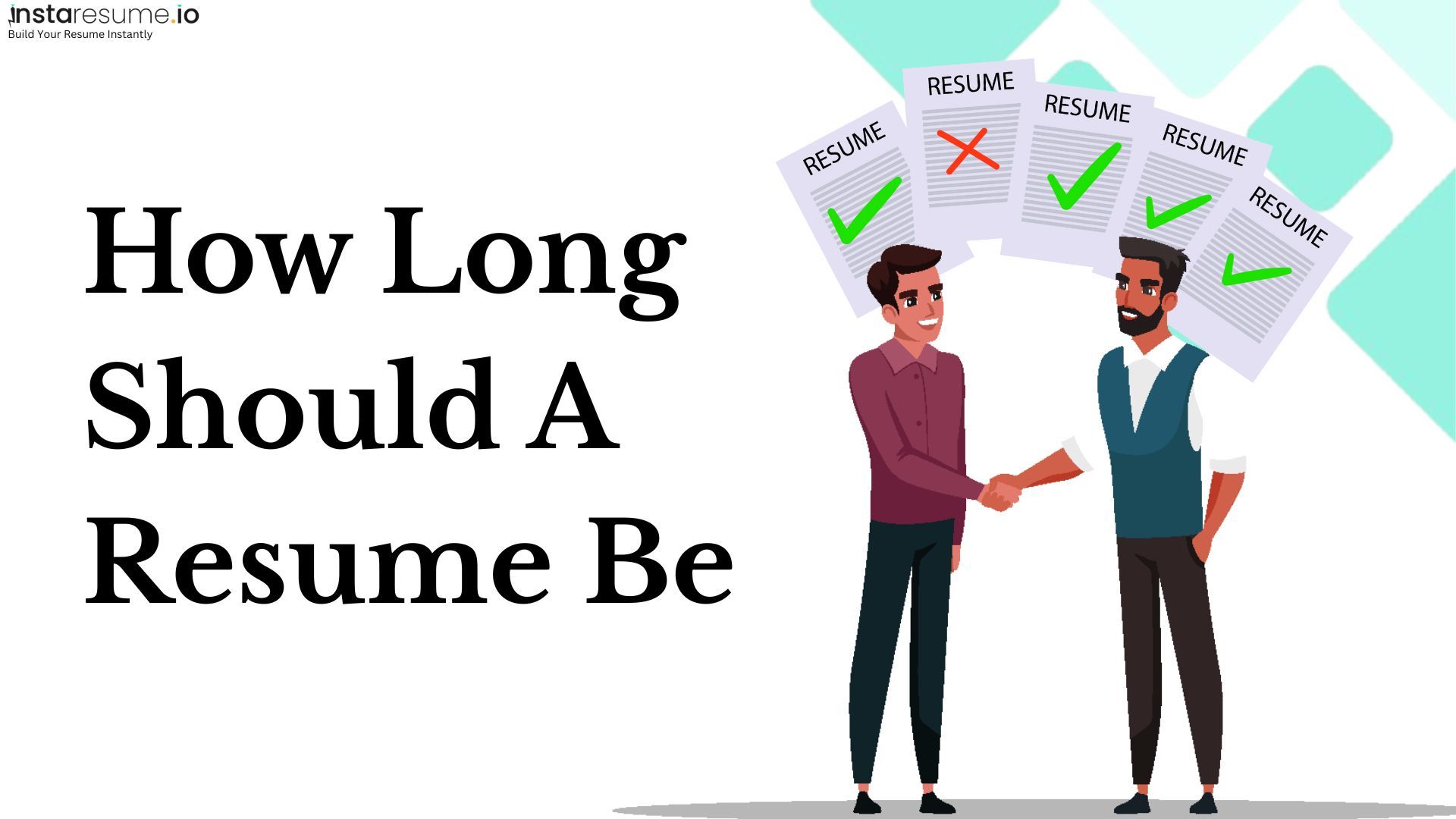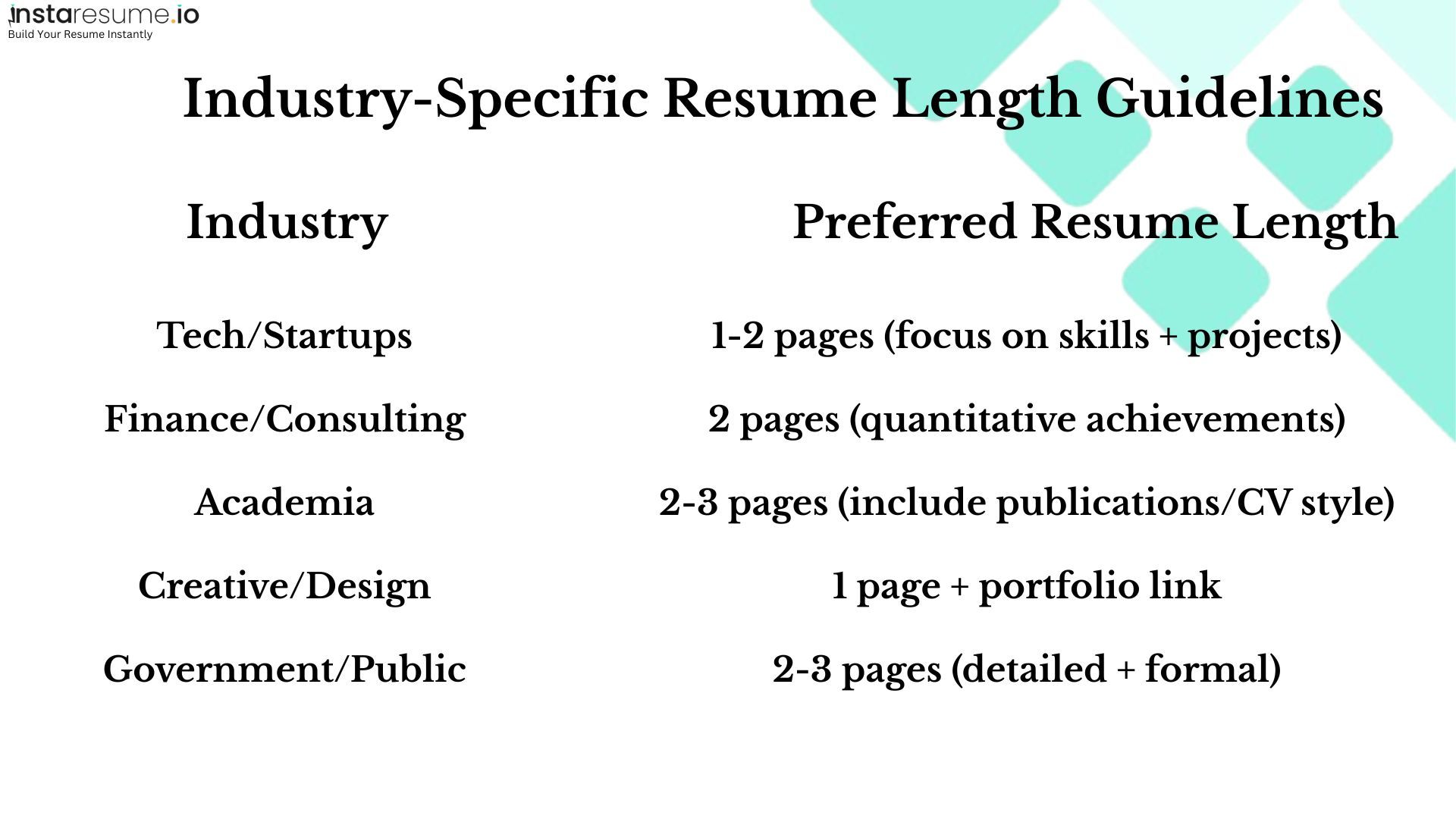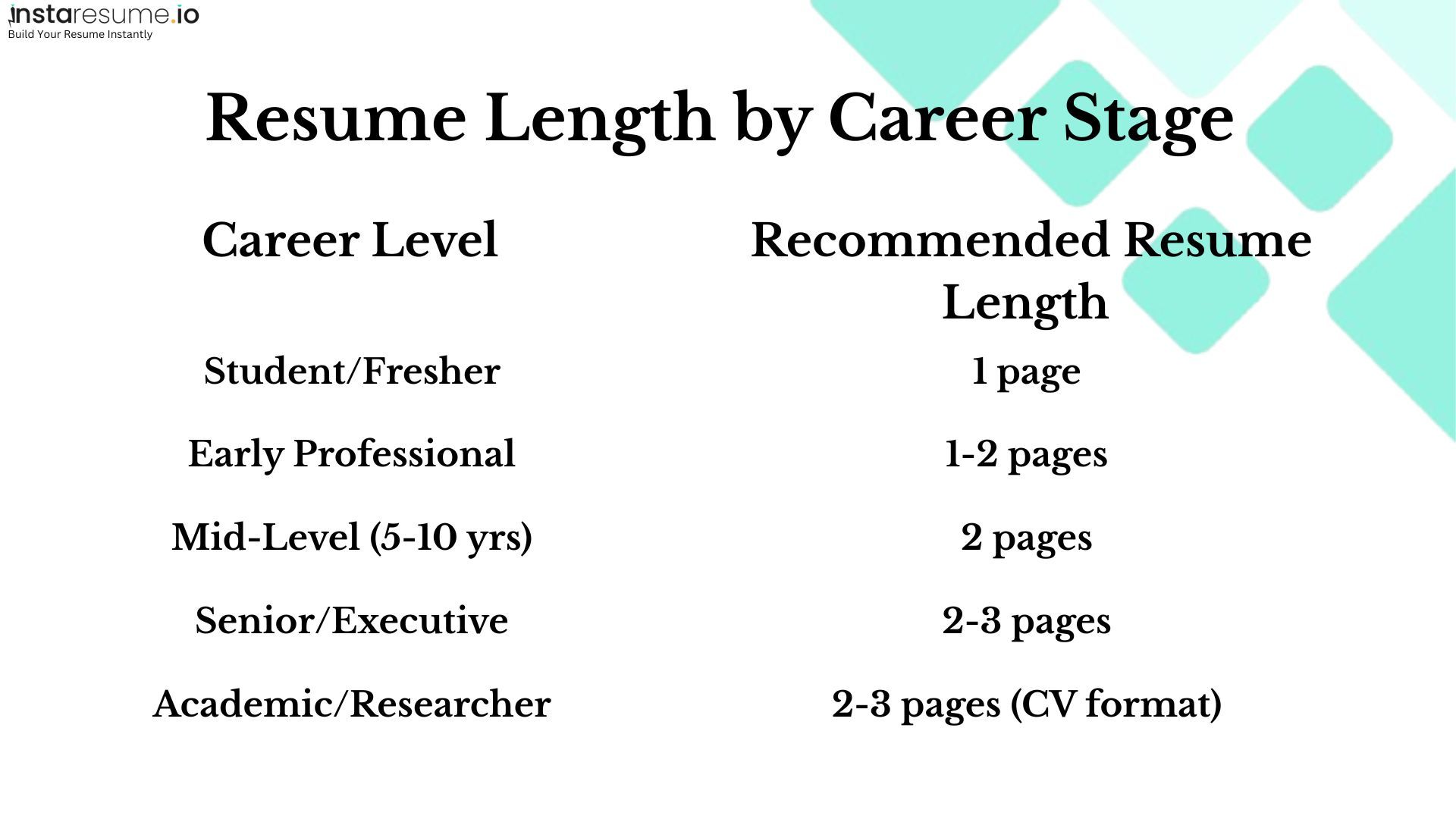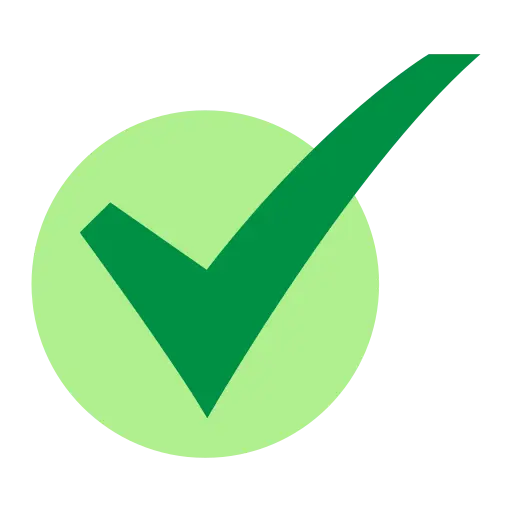How many pages should a resume be(1,2, or 3 pages)
Trust Score: 4.7
358 reviews

Table of Contents
When it comes to crafting the perfect resume, one question never seems to have a clear answer: “How many pages should my resume be?” It’s a debate that has puzzled job seekers for decades — and even seasoned professionals still second-guess whether their resume should be one page, two pages, or even three.
Here’s the truth: resume length isn’t a one-size-fits-all rule. The ideal number of pages depends on your experience level, career stage, and industry standards. A fresher with limited experience can shine on a concise one-page resume, while a senior executive with decades of achievements might justifiably need more room to tell their story.
But in an age of ATS (Applicant Tracking Systems) and recruiter attention spans averaging under 10 seconds, how much detail is too much — and how little is too little? Is a two-page resume the new norm in 2025, or do hiring managers still prefer a short, focused snapshot of your skills and results?
In this guide, we’ll break down the resume length dilemma with data-backed insights, recruiter expectations, and expert formatting tips. You’ll learn exactly when to keep it to one page, when to stretch to two, and the rare cases where a three-page resume actually works. Whether you’re a fresh graduate, a mid-career professional, or a senior executive, this article will help you strike the perfect balance between clarity, depth, and impact — so every page counts.
Why resume length matters
Resume length isn’t just a formatting detail — it’s a strategic decision that directly influences how recruiters perceive your professionalism, communication skills, and overall fit for a role. The number of pages you choose sends an unspoken message about your ability to prioritize, organize, and communicate your value efficiently.
Think of your resume as a marketing brochure for your career. Just like any great marketing material, it should grab attention quickly, convey key information clearly, and leave a lasting impression — all within a limited space. A resume that’s too short may seem underwhelming or incomplete, while one that’s too long can overwhelm hiring managers and risk losing their interest.
In today’s competitive job market, recruiters spend 6–10 seconds scanning a resume before deciding whether to read further. That means every word, bullet point, and line of text must serve a purpose. The right resume page count ensures your most relevant achievements are front and center — helping you pass ATS filters and impress human readers alike.
Moreover, different industries and experience levels demand different levels of detail. A one-page resume may be perfect for freshers or entry-level roles, while two pages often work best for mid-career professionals. A three-page resume, though rare, can be justified for senior executives or those in academia, research, or government sectors where depth matters more than brevity.
In short, resume length matters because attention is currency — and in the hiring world, how you use space on your resume can make the difference between being noticed and being overlooked.
One-page resume: Who should use it?
A one-page resume is ideal for:
 Freshers or entry-level candidates with less than 5 years of experience
Freshers or entry-level candidates with less than 5 years of experience Students or recent graduates with internships, projects, and academic achievements
Students or recent graduates with internships, projects, and academic achievements Career changers who want to emphasize transferable skills, not long histories
Career changers who want to emphasize transferable skills, not long histories
Benefits:
 Easy to scan quickly
Easy to scan quickly Forces clarity and brevity
Forces clarity and brevity Preferred by recruiters in tech, marketing, and startups
Preferred by recruiters in tech, marketing, and startups
Risks:
 May seem too minimal for experienced professionals
May seem too minimal for experienced professionals Limits space for keywords and achievements (important for ATS)
Limits space for keywords and achievements (important for ATS)
Two-page resume: The gold standard?
The two-page resume is generally accepted as the ideal format for most mid-level professionals.
It offers room to:
 Expand on work history with measurable achievements
Expand on work history with measurable achievements List certifications, awards, and relevant skills
List certifications, awards, and relevant skills Add a brief summary or professional profile
Add a brief summary or professional profile
Suitable for:
 Professionals with 5–15 years of experience
Professionals with 5–15 years of experience Candidates with multiple relevant roles or projects
Candidates with multiple relevant roles or projects Industries like IT, finance, education, and healthcare
Industries like IT, finance, education, and healthcare
Three-page resume: When is it justified?
A three-page resume may be acceptable in certain cases, especially:
 Executives or senior leaders with decades of experience
Executives or senior leaders with decades of experience Academics or researchers listing publications and speaking engagements
Academics or researchers listing publications and speaking engagements Technical professionals needing to list certifications, patents, or portfolios
Technical professionals needing to list certifications, patents, or portfolios
Rule of thumb:
If every line on your third page adds value, it's okay. If not — cut it.
How recruiters view resume length
Most recruiters don’t care how long your resume is — as long as the content is relevant, results-focused, and easy to read.
What annoys them?
 Walls of text
Walls of text Repetition
Repetition Generic job duties without outcomes
Generic job duties without outcomes Pages full of fluff
Pages full of fluff
Tip: Include metrics, keywords, and tailored content to impress both humans and ATS (Applicant Tracking Systems).
Industry-specific resume length guidelines
Resume length by career stage
Formatting tips to keep your resume concise
Even if your experience justifies a longer resume, smart formatting can enhance readability and reduce length.
Do:
 Use bullet points, not paragraphs
Use bullet points, not paragraphs Start with action verbs (e.g., “Led,” “Improved,” “Generated”)
Start with action verbs (e.g., “Led,” “Improved,” “Generated”) Include metrics (e.g., “increased revenue by 35%”)
Include metrics (e.g., “increased revenue by 35%”) Use professional templates (check out InstaResume.io)
Use professional templates (check out InstaResume.io)
Avoid:
 Overcrowding with small fonts
Overcrowding with small fonts Repeating the same duties under each job
Repeating the same duties under each job Listing outdated or irrelevant jobs
Listing outdated or irrelevant jobs
Common mistakes with resume length
Overloading with every job ever held
– Only list relevant experience (past 10–15 years is enough)
Using long paragraphs
– Bullet points improve scannability
Fluff and jargon
– Be specific, not vague
Misjudging what's "important"
– Think from the recruiter's perspective
FAQs
1. Is a 1.5-page resume acceptable, or does it need to be exactly 1 or 2 pages?
Yes, a 1.5-page resume is perfectly acceptable, especially for professionals who have outgrown the one-page format but don’t quite need two full pages. The key is to ensure that the content on that second page is still valuable and well-organized. Don’t artificially stretch your resume just to hit two pages — instead, focus on meaningful, relevant content that adds to your candidacy.
2. Should I include jobs from more than 15 years ago on my resume?
In most cases, it’s not necessary to include jobs from over 15 years ago unless those roles are highly relevant to the position you're applying for today. Hiring managers care more about recent, applicable experience. If older roles are impressive but not essential, consider summarizing them under a brief “Earlier Experience” section to save space.
3. Will a longer resume reduce my chances of getting hired?
Not if it’s filled with high-quality, tailored content. A longer resume only becomes a problem when it’s bloated with outdated information, vague responsibilities, or irrelevant jobs. As long as every section of your resume serves a purpose — showcasing results, highlighting skills, or aligning with the job requirements — extra length won’t hurt your chances.
4. Can I include hyperlinks to my portfolio, LinkedIn profile, or personal website in my resume?
Yes! In fact, adding hyperlinks is encouraged — especially in industries like tech, design, or marketing. Include a clickable LinkedIn URL, a personal website, or an online portfolio to provide recruiters with a deeper look into your work. Just make sure the links are short, relevant, and professional.
5. Do hiring managers actually read the second or third page of a resume?
They do — but only if the first page grabs their attention. That’s why your most impressive achievements, skills, and results should appear early in your resume. A compelling first page acts like a hook; if it’s strong, recruiters are more likely to keep reading through to the second and even third page.
6. Should I create a different resume for every job I apply to?
Yes, absolutely. Tailoring your resume to each job posting is one of the most effective ways to increase your chances of landing an interview. Customize your resume by adjusting keywords, emphasizing relevant achievements, and aligning your experience with the job description. This also improves your performance with Applicant Tracking Systems (ATS).
7. How can I fit my resume on one page without leaving out important details?
If you're struggling to condense your resume, prioritize quality over quantity. Focus on accomplishments rather than duties, use bullet points instead of paragraphs, and remove outdated or irrelevant roles. Use active language and quantifiable results to make your resume impactful, even with limited space.
8. What’s the difference between a resume and a CV?
A resume is a concise, job-focused document tailored to a specific role — typically 1–2 pages. A CV (Curriculum Vitae) is a comprehensive document that details your entire career, often running multiple pages, and is commonly used in academic, research, or international job applications. Know which format is standard in your industry before submitting.
9. Is it better to use a resume template or create one from scratch?
Using a professional template from a trusted platform (like InstaResume.io) is a great way to ensure your resume is clean, modern, and ATS-compliant. Templates save time and help you structure your content effectively, especially if you’re not confident in formatting. Just be sure to customize it to reflect your personality and career story.
10. How do I know if my resume is too long or too short?
Here’s a simple rule: if you can remove any part of your resume without losing value or context, it’s too long. On the flip side, if your resume feels vague or underwhelming, it might be too short. Aim for a length that includes only relevant, achievement-driven content tailored to your target job.
Conclusion
So, how many pages should your resume be?
The answer isn’t fixed — it depends on your experience, industry, and the job you’re applying for. One page is perfect for early-stage careers. Two pages hit the sweet spot for most professionals. Three pages? Use it only when you can back every line with value.
At the end of the day, it’s not about length — it’s about impact. The best resume is one that tells your story clearly, concisely, and confidently.








